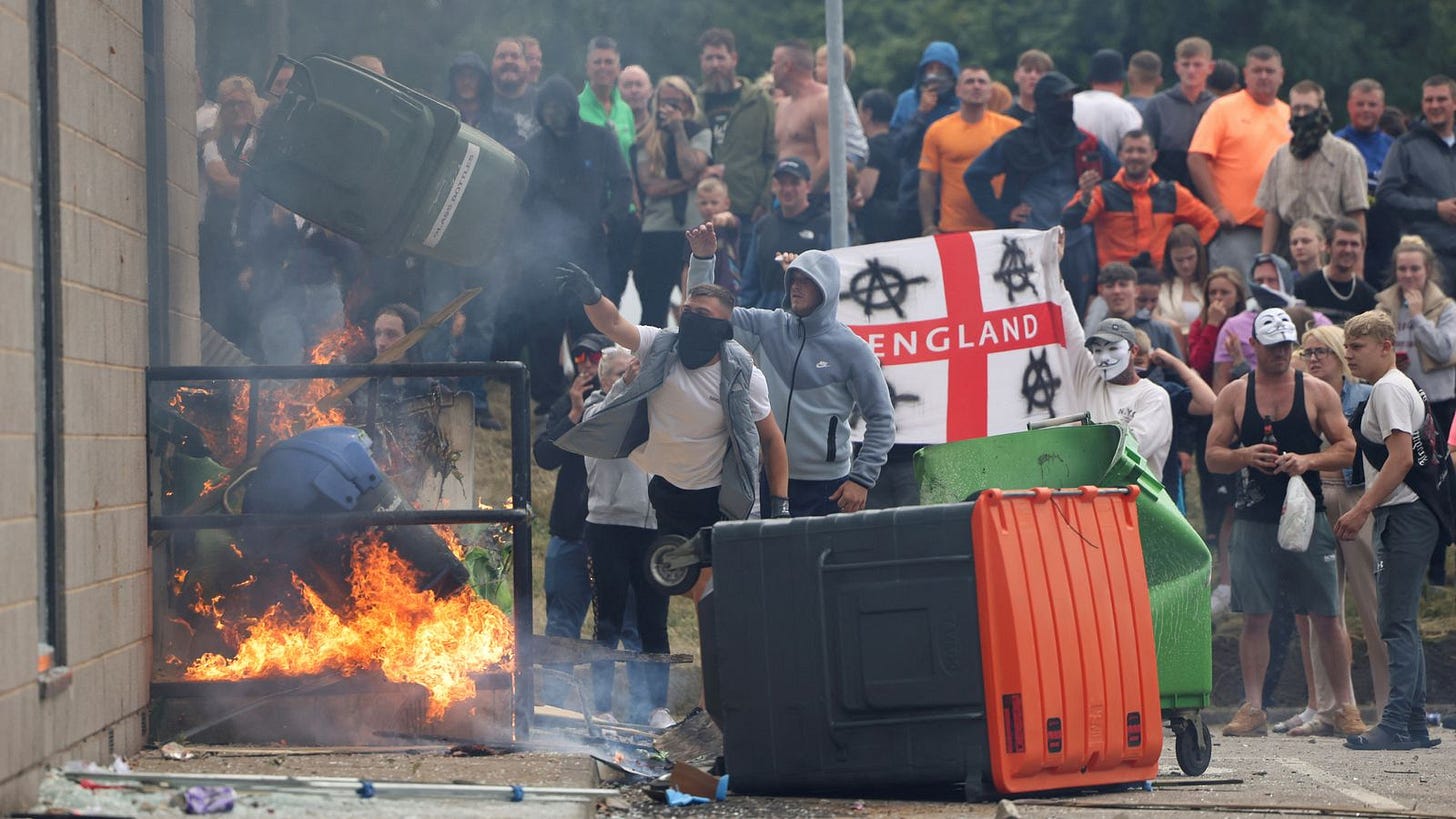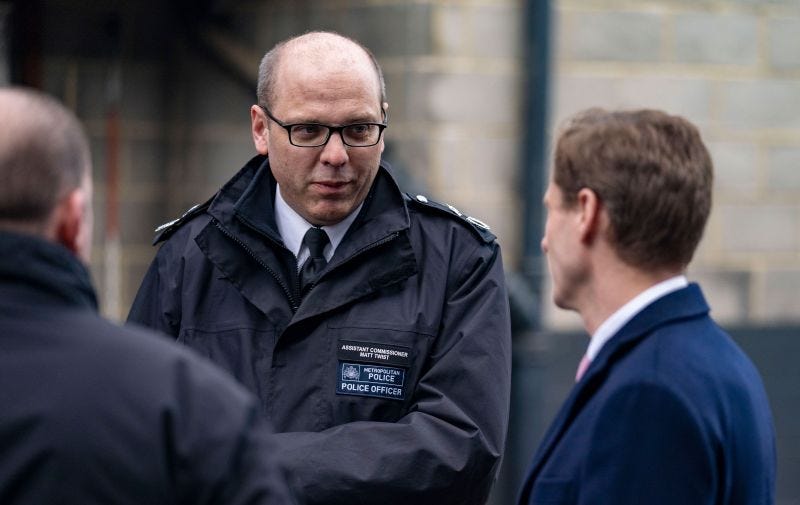Cake Policing
Is 'Tiered Policing' inevitable, and why?
This police cake clearly has THREE tiers.
I’ve written about the importance of narratives before, about how we parcel complex situations into bite-size stories to render them less confusing. I’ve also covered the recent disturbances in the UK and the problems of policing a multicultural (or Balkanised, take your pick) world city here. Palestine protests and softly-softly policing? I’ve got you covered.
You might have noticed there’s a new narrative in town. It’s here to stay; the police deliver nakedly biased policing at the behest of an authoritarian, left-wing Government. Like most narratives, it’s like a pearl. A grain of truth, surrounded by layers of calcified opinion, spin and misunderstanding.
As for me, I was a policeman for a long time, now I’m a writer and I pontificate about such matters on Substack. Yadda yadda. And, today, I’m going to humbly offer my take on ‘two-tier’ policing. Not only in public order and counter extremism, but in general. I’m going to attempt to explain how;
(1) Inconsistent outcomes in policing are inevitable and;
(2) How, sometimes, that isn’t necessarily a bad thing.
(3) But, too often, it is.
I’m also going to humbly offer my take on why the grain of truth behind the two-tier policing narrative is so poisonous, and how the police might seek an antidote. In short, I’m going to try my best to be even-handed. I know, it’s late 2024 and even-handedness is about as fashionable as watching a ‘Carry On’ movie while smoking an entire packet of Rothman’s in a pub beer garden.
I think most people would agree, whatever the flag being flown, this needs policing.
First of all, let me make a whimsical comparison. You decide to wander the United Kingdom in search of the perfect chicken sandwich. In trendy inner London you find a street food shack offering a funky Korean fried chicken bun. In sedate Richmond-upon-Thames, you discover a free-range roast chicken sandwich on sourdough. Meanwhile, in Luton you enjoy a perfectly pleasant and excellent value Greggs chicken bap. Indeed, as you travel this sceptred isle on your poultry-based quest, you discover a cornucopia of chicken sandwiches - halal or kosher, with or without mayo or mustard, garnished with a hundred different salads… dammit there’s even a plant-based chicken sandwich with no actual chicken in it.
The miracle? All of these chicken sandwiches are absolutely fine. People pay for them, eat them and enjoy them. Chicken sandwiches, it transpires, are situational. And, as long as they scratch that chicken-and-bread based itch, that’s okay. Nobody expects one perfect chicken sandwich to rule them all.
I think you see where I’m going with this.
Policing isn’t, in principle, much different. A rural crime team in North Wales will investigate a farmhouse burglary differently from inner city officers working in, say, Tottenham. Why? Environmental, social, geographical and cultural reasons. The countryside might not have much CCTV but people are happier talking to police. The inner city might be festooned with cameras (some of which might even work) but it’s a low-trust environment where gathering community intelligence is difficult.
The main thing, though, is this: given the circumstances, (and to prolong my sandwich analogy) and as long as the chicken-and-bread elements of the burglary investigation are covered, then that’s okay. Now, you might argue most police forces can’t properly investigate a simple burglary. You may even be right, but that’s a question for another post.
We can map this comparison across other crimes, although nowadays some are more politically-sensitive than others (our betters have decreed property rights aren’t as important, for example, as those impinging on protected characteristics).
This is where the grain at the centre of this pearlescent narrative lies.
Here’s the Met’s Assistant Commissioner Matt Twist (I remember when he had hair), admitting the Palestinian protests were a bit of a confusing sandwich-making scenario, one where he ran out of chicken.
“In public order policing, we are neutral as to the cause that is being protested. We base policing tactics on the threat, harm and risk based on the information and intelligence available to us,” he said. “In that sense, there is no such thing as two-tier or differential policing – there are, in fact, an infinite number of tiers of policing, depending on the threat, harm and risk.”
See? Infinite tiers. Infinite!
Is this (1) fair enough? (2) Spookily convenient? or (3) complicated?
Matt Twist: ‘Please stop talking about chicken sandwiches, I’m a very important policeman.’
Let’s unpack what Matt says, because he’s got a point. For example, during my service I think its fair to say the police were, broadly speaking, fairly neutral when it came to policing the majority of protests.
Anecdotally speaking, though, there were caveats; for example, there was an unspoken bias against white, working class men - especially football crowds and extreme right-wing demonstrators. It certainly wasn’t an ‘open-season’ type of bias, but more of a ‘they know the score’ attitude. This, looking back at it, might have had something to do with the fact most officers on public order serials where from a similar background - i.e. white, male and from the working or lower-middle classes.
As for minority groups? The opposite is more or less true. The softly-softly approach towards, say, the Notting Hill Carnival (two dead this year) is driven by perennial anxieties about the Met’s relationship with London’s Afro-Caribbean community. The dogs on the street know this. Any frontline copper with experience of Carnival knows it too. Look at the blatant, open-secret manipulation of crime statistics. Two-tier policing? Carnival has more tiers than an Aztec pyramid.
With that in mind, some questions: are these approaches situational or are they hopelessly biased? Are they both? Is ‘Without Fear or Favour’ a polite fiction? Is the real point here a lack of honesty and transparency by politicians and senior police officers? And, does a plant-based chicken sandwich really count as a chicken sandwich?
Back to AC Twist, who said, we base policing tactics on the threat, harm and risk based on the information and intelligence available.
I chuckled at this bit. You see, the Met Police massacred its intelligence capability (for austerity reasons) and it never really recovered (I worked in a number of counterterrorism, domestic extremism and criminal intelligence roles). Specialist domestic extremism intelligence slipped between the cracks in the CT pavement and has languished there ever since. Purely monitoring social media (i.e. being dictated to by a load of overseas Trolls / bots) does not an intelligence assessment make.
What Matt Twist really means to say is, we make a policing plan based on what we heard on Twitter, what our community leaders think and what SpAds whisper into our ears at COBR meetings. Oh, and we all know the score when it comes to the EDL. Right? Riiigghhht?
The Met’s public order intelligence database.
Let’s add into the multi-tier policing mix that other old chestnut - the ‘Community Leader’.
Commentators like Ed West have commented how multicultural Britain seems to have adopted an almost colonial approach to its relationship with minority groups. Which is to say the authorities subcontract engagement to often self-appointed community leaders who can ‘Get Stuff Done.’ This leads to a community leadership circuit / industry where few care (or know) how representative community leaders really are, as long as they deliver outcomes matching well-meaning public sector performance indicators.
In a police context, I’ve never seen a promotion form that didn’t feature how well the applicant managed community leadership stuff, as if police officers were still diplomats or district commanders in faraway outposts of empire.
Now, on the one hand, having a SPOC (single point of contact) in a ‘difficult to reach’ segment of the community is brilliant. It’s a phone call. Maybe it’s a trip to a place of worship. It’s a photo op. You ask, you negotiate, you get more or less what you want (which, for most police commanders, is a quiet life with no angry youth on the street).
Until you stumble across a problematic community who doesn’t have a community leader, self-appointed or otherwise. For example, the white, underclass, ‘low-information’ people (many with drugs and alcohol dependency) who rioted over the summer. People whose skin-colour, according to the critical theory bullshit many police forces have signed up to, makes them privileged.
No community leader to call. No temple to visit. And certainly no photo op. Oh, and remember, there’s no community intelligence either, right? There’s no effective neighbourhood policing and your ‘intelligence unit’ is sifting through bot-generated misinformation and Tommy Robinson memes.
Oh well, might as well get stuck in and set up some 24 hour courts, eh? what do you mean, the prisons are full?
Don’t for a minute think I’m going soft. I think the majority arrested for public order offences this summer thoroughly deserved their fate. I simply think everyone should be treated the same way.
And they aren’t (and probably can’t be) for all sorts of metaphorical chicken sandwich reasons.
Stacey Vint, 34, who pushed a flaming shopping trolley at police, was quite rightly imprisoned. Vint was homeless, with a history of alcohol and drug dependency. Hardly the face of privilege?
What can the police do? Personally, I work from the assumption the new British Establishment will remain of the hopelessly liberal left (for the time being, until the wheel turns), while the majority of the problematic policed (the white privileged lumpenproletariat) are not. Until the latter get with the program, to a certain extent, they’re going to be ‘othered’ as ‘The Far Right’, with no critical theorist riding gallantly to their rescue.
We’re heading towards a sectarianism of the sort we see in Northern Ireland. Depressing, but I used to study this stuff for a living and it’s simply how I see it. Therefore, within these constraints, police can;
Recognise the problem. To be fair, Andy Cooke, HM Chief Inspector of Constabulary, does. His report might predate the current government, but it applies to them equally. Operational independence needs to be restored, not just in theory but in practice. That means eliminating groupthink in senior police cadres and allowing (whisper it) diversity of opinion. I have met Mr. Cooke in a professional capacity. Although I don’t have much time for senior coppers as a rule, Cooke is a pragmatist who oozes commonsense. The Home Office should heed his wise counsel.
Rethink public comms and engagement. The military realise information is a ‘domain’ in and of itself. The police doesn’t. The disorder in August was prompted by disinformation after a terrible murder, after a summer of stabbings. The police information playbook, cautious for understandable legal reasons, badly needs revisiting. This applies to police shootings and use of force, too. Police need to revise media ops to win trust and combat disinformation. This means, on occasion, possibly disseminating material the centre might not like disseminating - especially on issues around immigration and integration. The police serve the public before the political interests of the State. Right?
Restore impartially. Yes, the police need to police impartially. That this even needs saying suggests a problem, right? Chief officers need to occasionally butt heads with mayors and politicians. The entire cats cradle of police accountability needs rethinking - the Establishment ghost in the machine needs exorcising. Political partisans should realise everyone benefits from this - even, in the long term, them.
Stop talking about Policing by Consent. The sooner we bury this long-dead parrot the better (‘he’s pining for the fjords!’).
Andy Cooke QPM, Chief Inspector of Constabulary, has the Adler seal of approval (sorry, Andy).
I’m a realist. We live in an atomised, increasingly balkanised and politically infantilised society. Expectations of policing will never match demand. Therefore police should stop trying to police everything and concentrate on their core mission. Less conferences with buffets and more boots on the ground. I know, you’re a chief superintendent, shaking your head at my Jurassic opinions.
Guess what? You’re the one with the problem. All that other stuff you’re expending oxygen on?
It doesn’t matter.
It’s a chicken sandwich. Start with some chicken and some bread.







Policing is inherently messy, operates in grey areas, people are dissatisfied and will seek to influence policing to favour their own particular group? Who'd a thunk it?
Excellent piece, the same crap has been going on for years over here in Northern Ireland with the PSNI.
Which was highlighted by the political interference from Sinn Fein/IRA that caused the then Chief Constable and Deputy Chief Constable to suspend one Constable and move another Constable after an arrest in Belfast. The two young officers were carrying out their lawful duty. This led the Feds to bring a court case against them where it was found that the CC and DCC were wrong and their actions were unlawful. The said CC resigned and the DCC went sick (before he was sacked).